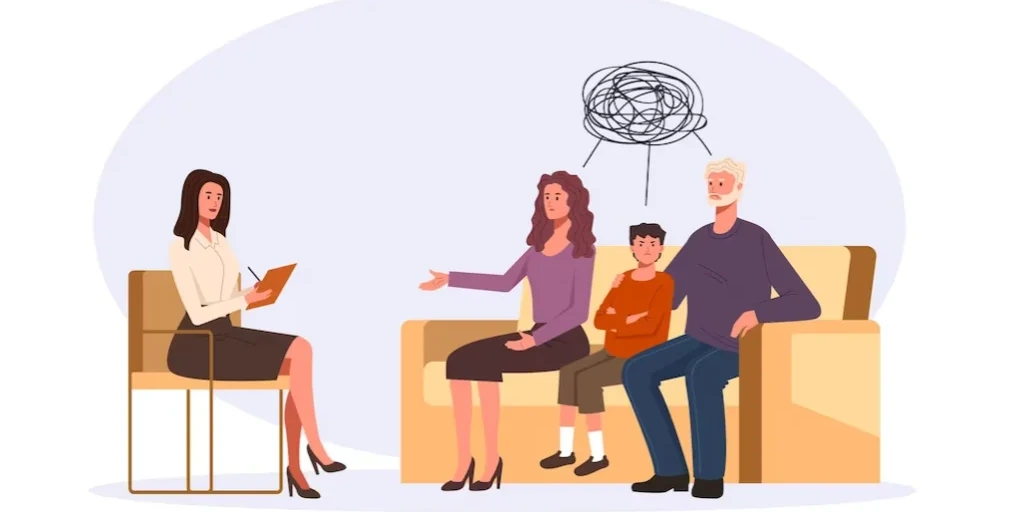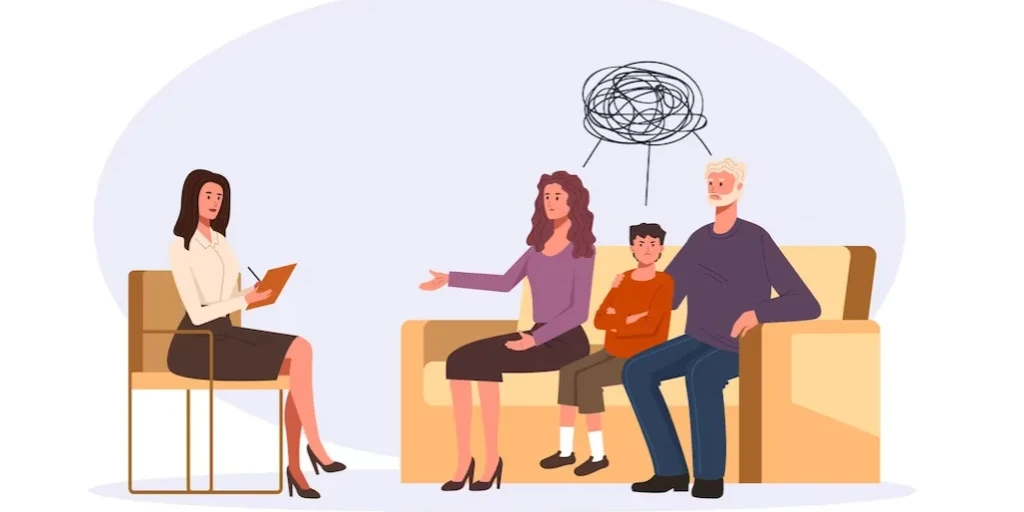24/7 Helpline:
(866) 899-221924/7 Helpline:
(866) 899-2219
Learn more about Opioid Rehab centers in Piedmont
Opioid Rehab in Other Cities

Other Insurance Options

State Farm

Health Partners

Absolute Total Care

WellPoint

Meritain

BlueCross

Amerigroup

UnitedHealth Group

EmblemHealth

Ceridian

CareFirst

GEHA

Kaiser Permanente

ComPsych
Beacon

Horizon Healthcare Service

Medical Mutual of Ohio

Highmark

Multiplan

Access to Recovery (ATR) Voucher

NorthCare Family Treatment Center
NorthCare Family is a dual diagnosis substance use rehab center in Piedmont, OK, providing mental he...

FCC Behavioral Health
FCC Behavioral Health is designed to comprehensively meet the wellness needs of seriously mentally i...

Southeast Missouri Behavioral Health
Southeast Missouri Behavioral Health is an outpatient facility that offers treatment for individuals...


MedMark Treatment Centers
MedMark Treatment Centers in Oxford, Alabama offers drug rehab services to men and women. They speci...

Northeast Alabama Regional Medical Center – Behavioral Health
Northeast Alabama Regional Medical Center - Behavioral Health, located in Anniston, Alabama, provide...

Cleburne Mental Health Center
Cleburne Mental Health Center is a private rehab located in Anniston, Alabama. Cleburne Mental Healt...

Anniston Fellowship House
Anniston Fellowship House is a private rehab located in Anniston, Alabama. Anniston Fellowship House...

Professional Counseling Associates
Professional Counseling Associates, located in Jacksonville, Arkansas, offers behavioral health care...

River Region Human Services – Andy’s Place
At RRHS (River Region Human Services), individuals can find a comprehensive range of treatments and ...

Riverside Tradition House
Riverside Tradition House is a private rehab located in Jacksonville, FL. Riverside Tradition House ...

Community Rehabilitation Center
Community Rehabilitation Center offers outpatient treatment for individuals with alcohol and/or subs...

Cathedral Foundation – Outpatient
Cathedral Foundation – Outpatient is a private rehab located in Jacksonville, Florida. Cathedral Fou...

Wekiva Springs
Wekiva Springs Center, located in Jacksonville, FL, provides behavioral health and substance use dis...

Alco Halfway House
Alco Halfway House is a private rehab located in Jacksonville, Florida. Alco Halfway House specializ...

Alcoholic Service Center
Alcoholic Service Center is a sober living house for individuals struggling with substance addiction...

Stepping Stone Center for Recovery
Stepping Stone Center for Recovery is a licensed rehab facility that provides alcohol and drug treat...

Northwest Behavioral Health – Edgewood Avenue North
Northwest Counseling & Wellness Center (NCWC) is a drug and alcohol center in Austin, Texas. NCWC de...

Baptist Medical Center – Baptist Behavioral Health
Baptist Medical Center–Baptist Behavioral Health, in Jacksonville, Florida, is a comprehensive menta...

Lakeview Health
Lakeview Health is a gender-responsive, dual diagnosis treatment center. It offers medically monitor...

River Region Human Services – Derya Williams Campus
River Region Human Services - Parental Home Road offers inpatient and outpatient treatment for indiv...

Gateway Community Services on Stockton
Gateway - Stockton Street is a private rehab located in Jacksonville, Florida. Gateway - Stockton St...

Northwest Behavioral Health Services – North Edgewood Avenue
Northwest Behavioral Health Services - North Edgewood Avenue is an alcohol and drug rehab treatment ...

River Point Behavioral Health
River Point Behavioral Health, located in Jacksonville, Florida, offers drug rehab, mental health tr...

New Season – Jacksonville Metro Treatment Center
New Season – Jacksonville Metro Treatment Center is a drug and alcohol treatment center that support...

New Season – Duval County Treatment Center
New Season - Duval County Treatment Center is a private rehab located in Jacksonville, FL. New Seaso...

Manthers Place Counseling
Manthers Place Counseling is a private rehab located in Jacksonville, Florida. Manthers Place Counse...

North Florida Comprehensive Treatment Center
North Florida Comprehensive Treatment Center is a private rehab located in Jacksonville, Florida. No...

Compassionate Care Recovery
Compassionate Care Recovery is a private rehab located in Wellington, Florida. Compassionate Care Re...

Sober Living America
Sober Living America (SLA) is a trusted drug and alcohol addiction treatment center in Jacksonville,...

Jacksonville Men’s Rehab
Jacksonville Men’s Rehab, part of Teen Challenge, is here to help through faith-based residential pr...

Jacksonville Women’s Rehab
Jacksonville Women’s Rehab, part of Teen Challenge, is here to help through faith-based residential ...

Vijapura Behavioral Health
Vijapura Behavioral Health is a private rehab located in Jacksonville, Florida. Vijapura Behavioral ...

Child Guidance Center – Westside Office
Child Guidance Center – Westside Office is a private rehab located in Jacksonville, Florida. Child G...

Gateway – Lexington Avenue
Gateway - Lexington Avenue offers outpatient treatment for individuals with alcohol and/or substance...

River Region Human Services – Kennedy Community Center
River Region Human Services - Bridier Street offers halfway house services for individuals with alco...

Mental Health Centers of Central Illinois
Mental Health Centers of Central Illinois is a private rehab located in Jacksonville, Illinois. Ment...

Wells Center
Wells Center is a private rehab located in Jacksonville, Illinois. Wells Center specializes in the t...

Gateway Foundation
Gateway Foundation offers substance use disorder treatment including comprehensive psychiatric servi...

Sumner Mental Health Center
Sumner Mental Health Center is a private rehab located in Wellington, Kansas. Sumner Mental Health C...

Compass Behavioral Center
Compass Behavioral Center is a private rehab located in Alexandria, Louisiana. Compass Behavioral Ce...

Choices of Louisiana
Choices of Louisiana is a private rehab located in Alexandria, Louisiana. Choices of Louisiana speci...

Ocean Behavioral Hospital
Ocean Behavioral Hospital is a private rehab located in Alexandria, Louisiana. Ocean Behavioral Hosp...

Edgefield – Outpatient Services
Edgefield - Outpatient Services is located in Alexandria, Louisiana. Edgefield - Outpatient Services...

Lutheran Social Services – Alexandria
Lutheran Social Services – Alexandria is a private rehab located in Alexandria, Minnesota. Lutheran ...

Milestones
Milestones Intensive Residential is a private residential rehab located in Alexandria, MN. The facil...

Haven House
Haven House is a private rehab located in Oxford, Mississippi. Haven House specializes in the treatm...

Stonewater Adolescent Recovery Center
Stonewater Adolescent Recovery Center offers inpatient and outpatient treatment for adolescents with...

Oxford Treatment Center
Oxford Treatment Center provides comprehensive, cost-effective treatment for drug and alcohol addict...

Onslow County Behavioral Health
Located in Jacksonville, North Carolina, Onslow County Behavioral Health provides mental health trea...

Jacksonville Treatment Center
Jacksonville Treatment Center is a private rehab located in Jacksonville, North Carolina. Jacksonvil...

Anew River Counseling Services
Anew River Counseling Services is a private rehab located in Jacksonville, North Carolina. Anew Rive...

Spirit of Excellence Community Outreach
Spirit of Excellence Community Outreach is a non-profit rehab located in Jacksonville, North Carolin...

CeJa Counseling Services
CeJa Counseling Services is a private rehab located in Oxford, Pennsylvania. CeJa Counseling Service...

The Salvation Army – Alcohol and Drug Addiction
The Salvation Army – Alcohol and Drug Addiction is a non-profit rehab located in Alexandria, Virgini...

Fairfax Falls Church Community Services Board – South County Center
Fairfax Falls Church Community Services Board - South County Center provides outpatient programming ...

Inova Behavioral Health Outpatient Center
Inova Behavioral Health Outpatient Center is a non-profit rehab located in Alexandria, Virginia. Ino...

Center For Discovery Alexandria
Center For Discovery Alexandria is a private rehab located in Alexandria, Virginia. Center For Disco...



































































Agency for Substance Abuse
Agency for Substance Abuse is a private rehab located in Anniston, Alabama. Agency for Substance Abu...

Helping Partners
Helping Partners is a private rehab located in Anniston, Alabama. Helping Partners specializes in th...

Self Recovery
Self Recovery is a private rehab located in Oxford, Alabama. Self Recovery specializes in the treatm...

Anniston Rehabilitation Center
Anniston Rehabilitation Center is a private rehab located in Anniston, Alabama. Anniston Rehabilitat...

Bradford Health Services
Bradford Health Services provides outpatient and intensive outpatient treatment for individuals with...

Highland Health Systems – New Directions
Highland Health Systems - New Directions is a rehab center that offers outpatient treatment services...

Birch Tree Communities
Birch Tree Communities is a dual diagnosis treatment center located in Oxford, AR for men and women....

Greenfield Center
Greenfield Center is a private rehab located in Jacksonville, Florida. Greenfield Center specializes...

Townsend Recovery
Townsend Recovery is a private rehab located in Jacksonville, Florida. Townsend Recovery specializes...

Alcoholic Rehab Fellowship House
Alcoholic Rehab Fellowship House is a private rehab located in Jacksonville, FL. Alcoholic Rehab Fel...

Baptist Behavioral Health
Baptist Behavioral Health is a private rehab located in Jacksonville, Florida. Baptist Behavioral He...

Child Guidance Center Case Management Services – Outpatient
Child Guidance Center Case Management Services – Outpatient is a private rehab located in Jacksonvil...

Alco Club
Alco Club hosts Alcoholic Anonymous meetings and community activities for individuals in recovery. A...

A New Life for Women
A New Life for Women is a private rehab located in Jacksonville, Florida. A New Life for Women speci...

CD Chemical Dependency Counseling
CD Chemical Dependency Counseling is a private rehab located in Jacksonville, Florida. CD Chemical D...

Winners Group
Winners Group is a private rehab located in Jacksonville, Florida. Winners Group specializes in the ...

Awakening Recovery Center
Awakening Recovery Center stands as a reputable substance abuse rehab center in Jacksonville, Florid...

River Region Human Services
River Region Human Services - Park Street offers outpatient treatment for individuals with alcohol a...

Baptist Wolfson Children’s Rehabilitation
Baptist Wolfson Children’s Rehabilitation is a private rehab located in Jacksonville, Florida. Bapti...

Lakeview Health Systems
Lakeview Health Systems is a private rehab located in Jacksonville, Florida. Lakeview Health Systems...

Mental Health Resource Center – Beach Boulevard
Mental Health Resource Center – Beach Boulevard is a drug and alcohol rehab center located in Jackso...

AA – Alcoholics Anonymous
AA – Alcoholics Anonymous is a non-profit rehab located in Jacksonville, Florida. AA – Alcoholics An...

Angels House – Angels Recovery
Angels House – Angels Recovery is a private rehab located in Wellington, Florida. Angels House – Ang...

Atlantic Coast Rehabilitation
Atlantic Coast Rehabilitation is a private rehab located in Jacksonville, Florida. Atlantic Coast Re...

Care Alliance of America
Care Alliance of America is a private rehab located in Jacksonville, Florida. Care Alliance of Ameri...

Breakthroughs Counseling & Recovery
Breakthroughs Counseling & Recovery is a substance abuse treatment center in Jacksonville, Florida. ...

Gateway – Boy’s Recovery Center
Gateway - Boy's Recovery Center offers inpatient treatment for individuals with alcohol and/or subst...

Trout River Club
Trout River Club is a non-profit rehab located in Jacksonville, Florida. Trout River Club specialize...

Sigma Center for Counseling
Sigma Center for Counseling is a private rehab located in Jacksonville, Florida. Sigma Center for Co...

Gateway – Girls’ Recovery Center
Gateway - Girls’ Recovery Center is a private rehab located in Jacksonville, Florida. Gateway - Girl...

Got Real Recovery
Got Real Recovery is a private rehab located in Wellington, Florida. Got Real Recovery specializes i...

River Region Human Services – Carmichael Avenue
River Region Human Services – Carmichael Avenue is a non-profit rehab located in Jacksonville, Flori...

Mental Health Resource Center – 20th street
MHRC is a mental health resource center located in Jacksonville, Florida. They offer their services ...

Recovery Keys
Recovery Keys stands as an accredited drug and alcohol rehab center in Jacksonville, Florida for ind...

Gateway Community Services New Beginnings
Gateway Community Services New Beginnings is a private rehab located in Jacksonville, Florida. Gatew...

Cipriano & Johnson Counseling
Cipriano & Johnson Counseling is an outpatient program offering substance abuse and mental health co...

Substance Abuse Rehabilitation Program
Substance Abuse Rehabilitation Program is a private rehab located in Jacksonville, Florida. Substanc...

D’Arienzo Psychological Group
D'Arienzo Psychological Group is dedicated to provide psychotherapy, counseling and life coaching to...

River Region Human Services – Mental Health
River Region Human Services – Mental Health is a private rehab located in Jacksonville, Florida. Riv...

Star Guides Wilderness
Star Guides Wilderness is a private rehab located in Jacksonville, Florida. Star Guides Wilderness s...

Wellington Retreat
Wellington Retreat is a private rehab located in Wellington, Florida. Wellington Retreat specializes...

Peace of Mind Counseling
Peace of Mind Counseling, located in Wellington, Florida, offers alcohol and drug rehab programs and...

River Region Human Services – Justina Community Center
River Region Human Services - Park Street offers outpatient treatment for individuals with alcohol a...

River Region Human Services – Matrix House
Located in Jacksonville, Florida, River Region Human Services – Matrix House is a drug and alcohol t...

River Region Human Services – Warrington Street
River Region Human Services - Warrington Street offers outpatient services for individuals with alco...

River Region Human Services – HEY Youth Program
River Region Human Services - Reyko Road offers outpatient treatment for individuals with alcohol an...

Elm City Center
Elm City Center is a private rehab located in Jacksonville, Illinois. Elm City Center specializes in...

Liberty Counseling Center
Liberty Counseling Center is a private rehab located in Jacksonville, Illinois. Liberty Counseling C...

Mirror
Mirror is a non-profit agency dedicated to provide services to those individuals who are struggling ...

Oxford House Red River
Oxford House Red River is a non-profit home located in Alexandria, LA. Oxford House Red River helps ...

ReEntry Solutions – Integrity Life Skills & Recovery Center
ReEntry Solutions is a non-profit rehab located in Alexandria, LA. ReEntry Solutions is an Intensive...

Palmetto Addiction Recovery Center
Palmetto Addiction Recovery Center is a private rehab located in Alexandria, Louisiana. Palmetto Add...

Tri County Mental Health Services
Tri County Mental Health Services is a private rehab located in Oxford, Maine. Tri County Mental Hea...

Crossroads for Youth
Crossroads for Youth is a non-profit agency that serves at-risk children and youth. They provide eve...

Lakeland Mental Health Center – Alexandria
Lakeland Mental Health Center – Alexandria is a private rehab located in Alexandria, Minnesota. Lake...

New Visions Center – Outpatient
New Visions Center provides a level of care for those that need intensive outpatient programming and...

MCAS New River – Substance Abuse Counseling Center
MCAS New River – Substance Abuse Counseling Center is a private rehab located in Jacksonville, North...

Caring Hearts Counseling
Caring Hearts Counseling is a private rehab located in Oxford, North Carolina. Caring Hearts Counsel...

New Insights DWI Services & Counseling
New Insights DWI Services & Counseling provides DWI assessment and substance abuse treatment service...

AA – Alcoholics Anonymous
AA – Alcoholics Anonymous is a non-profit rehab located in Oxford, North Carolina. AA – Alcoholics A...

Chemical Dependency Training
Chemical Dependency Training is a counseling-clinic rehab located in Jacksonville, NC. Chemical Depe...

MCCS Lejeune New River – Substance Abuse Counseling Center – SACC
MCCS Lejeune-New River - Substance Abuse Counseling Center (SACC) provides outpatient and intensive ...

Lorain County Alcohol and Drug Abuse Services
Lorain County Alcohol and Drug Abuse Services is a private rehab located in Wellington, Ohio. Lorain...

Fairfax Falls Church Community Services Board – Crossroads
Fairfax Falls Church Community Services Board - Crossroads is a residential treatment facility for a...

Alexandria Community and Human Services – North Beauregard Street
Alexandria Community and Human Services – North Beauregard Street is a public rehab located in Alexa...

Community Residences – Crisis Stabilization
Community Residences – Crisis Stabilization is a private rehab located in Alexandria, Virginia. Comm...

Addiction Services
Addiction Services is a public rehab located in Alexandria, Virginia. Addiction Services specializes...

Ethos Foundation
The Ethos Foundation is a non-profit Virginia corporation that has served Northern Virginia and its ...

Alexandria Community and Human Services – North Saint Asaph Street
Alexandria Community and Human Services – North Saint Asaph Street is a public rehab located in Alex...

PRS Mount Vernon
PRS Mount Vernon is a private rehab located in Alexandria, Virginia. PRS Mount Vernon specializes in...

Center For Discovery Alexandria Outpatient
Center For Discovery Alexandria Outpatient is a public rehab located in Alexandria, Virginia. Center...

Kolmac Outpatient Recovery Centers
Kolmac Outpatient Recovery Centers is a private rehab located in Alexandria, Virginia. Kolmac Outpat...

AA – Alcoholics Anonymous
AA – Alcoholics Anonymous is a non-profit rehab located in Alexandria, Virginia. AA – Alcoholics Ano...















































































































